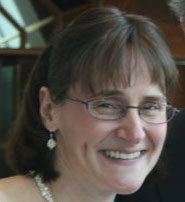The Haverford professor is on a mission of discovery
By Harper Hubbeling
Jennifer Punt wanted to grow up to be a writer.
“My dream in life was to be a novelist,” said Punt, leaning back in her chair to glance into the lab adjoining her office on the second story of the Koshland Integrated Natural Science Center at Haverford College.
Punt, 48, is no novelist. She is a biology professor and researcher at Haverford. Her lab studies immunology, looking at the development of thymocytes, a type of white blood cell critical to the body’s immune response.
Punt said she was, “very shy,” and, “very nerdy,” as a kid and that she was always, “very bad at following directions and learning a body of something that was already defined.”
“I just wasn’t that interested,” Punt said.
What did interest Punt?
“Since I was very little, I wanted to discover something,” Punt said. She recalls playing piano as a girl, slamming her hands down on the keys with the intense frustration of, “just wanting to discover something,” and not knowing how.
Punt was an undergraduate at Bryn Mawr College from 1979 to 1983. She went on to get a doctoral degree in veterinary medicine her the University of Pennsylvania. In 1996, just 13 years after leaving the Bi-co, she returned, beginning her teaching and research career at Haverford.
Her mission: discovery
At Haverford, Punt’s job description includes, “discovering something.”
“I couldn’t imagine a better job,” she said, “what more could I ask for than to be able to figure things out… I can be very excited by knowing that I know something new.”
And what is Punt is discovering?
Punt studies how the defense mechanisms in our bodies “see” the difference between invaders and self. You and a virus are both made of proteins. But your immune system must be able to distinguish between these proteins, labeling one as “bad” and the other as “good.”
If it cannot, your immune system will destroy itself, eating the body it was assigned to protect.
Autoimmune disorders like Type I diabetes and multiple sclerosis are examples of this problem: the immune system turned against itself.
“How the body defines usefulness and dangerousness is at the root of some interesting questions,” said Punt.
Punt looks at how thymocytes “learn” to distinguish good and evil in the molecular world. Thymocytes develop in a small organ above the heart, called the thymus, where they are shown examples of various proteins and “taught” what to attack – and what to leave alone.
To study this education process, Punt uses mice. Unfortunately, she cannot study a mouse’s thymus while the mouse is alive.
“I should’ve gone into drosophila work,” Punt jokes, referring to the scientific name for fruit flies. She hates killing the mice.
“Yet what I’m fascinated by is the thymus, and drosophila don’t have a thymus and bacteria don’t have a thymus. It’s an odd joke life has played on me,” Punt says.
“What exactly does Punt find so fascinating about the thymus?
“The truth is, I can go down to the nitty-gritty and care about PP2AB’ [a protein] and its isomers [variant forms] very easily,” said Punt.
Science as cooperation
But she said she doesn’t find her main inspiration at this “nitty-gritty” molecular level.
She points to much larger scale interactions – the interpersonal relationships between scientists – as what drives her to come into lab each morning.
I like those moments where people’s personalities intervene with development,” Punt says, adding that science is, “a process,” and that, “the sequence of events that lead to discoveries could be all mish-mashed and changed in ways that would change the sequence of discoveries and I love that.”
Punt enjoys watching these cooperative scientific interactions unfold. In fact, she enjoys them so much that she seeks out collaboration, even when other scientists would shy away.
Science is competitive. Many scientists view their works as a race – a race to that “discovery” that Punt wanted so much as a child. Sharing isn’t the norm in this competitive scientific culture. Sharing slows you down.
Yet last fall, Punt chose to give a huge piece of her data away to a fellow immunologist, Kristin Hogquist, from the University of Minnesota.
“Everybody said don’t, don’t be this generous, don’t do this kind of stuff,” said Punt.
But she doesn’t regret her decision.
“I still don’t understand why this is problematic,” Punt said.
For Punt, sharing her data was just her way of letting her personality intervene and alter the sequence of events that leads to discovery. When she sent her data to Hogquist, she was rewriting the narrative of science.
So perhaps Jenni Punt did grow up to be a writer.
“I love the stories in science,” she says, “I love both the biochemical stories, and the molecular stories, but also the people.”
Looking back on her young dreams of novel writing, Jenni seems relieved that she turned away from her original aspirations, finding a less traditional form of writing – one that suits her well.
“I wrote a lot of stuff,” said Punt, “but I couldn’t get the plot line. In science I could always find my plots.”
